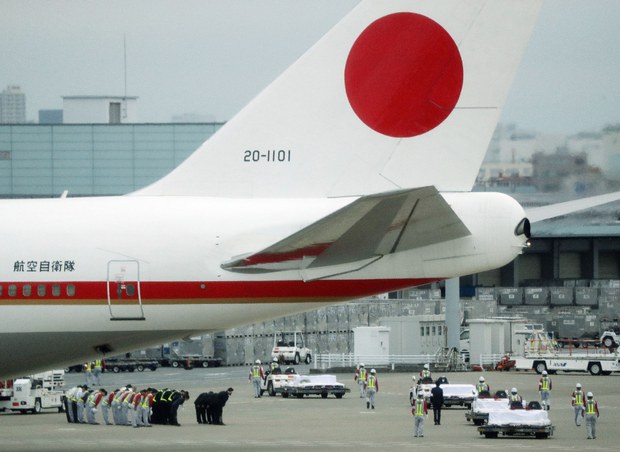Dhaka Attack: Bangladesh Seeks International Help to Fight Terror
2016.07.05
Dhaka
 Airport workers and officials bow toward the coffins of Japanese victims of the July 1 and 2 terror attack in Bangladesh, after their arrival at Tokyo International Airport in Haneda, July 5, 2016.
Airport workers and officials bow toward the coffins of Japanese victims of the July 1 and 2 terror attack in Bangladesh, after their arrival at Tokyo International Airport in Haneda, July 5, 2016.
Updated at 7:07 p.m. ET on 2016-07-05
Three days after a terror attack in Dhaka’s diplomatic quarter left at least 20 hostages and two policemen dead, Bangladeshi officials Tuesday took the rare step of announcing that the government would ask other countries for help in combating terrorism.
Italy’s deputy foreign minister pledged that his country would help Dhaka fight terrorism and militancy, and U.S. Secretary of State John Kerry offered the South Asian nation assistance from the FBI in investigating the attack on the Holey Artisan Bakery café, according to reports.
“The government is firmly determined to eliminate militancy of all forms and necessary cooperation from the neighboring and the friendly countries will be sought in this regard,” Home Minister Asaduzzaman Khan Kamal told a press conference at his secretariat office on Tuesday. He read from a statement but did not take questions from reporters.
A political analyst described the move by Bangladesh as unusual.
“The government has been under tremendous pressure from the international community on the question of militant attacks in Bangladesh. But we have not seen the government openly seeking international support,” Humayun Kabir, a former ambassador and vice president of the Bangladesh Enterprise Institute, a private think-tank, told BenarNews.
He was referring to the attack at the café as well as a series of attacks by suspected militant that have killed dozens of other people, including secular writers, intellectuals, gay rights activists and religious minorities since February 2013.
“I think seeking international support is a good decision to fight terrorism and militancy – a global problem,” Kabir said, adding that the government should address the “menace of terrorism as effectively as possible.”
Killers came from elite
Nine Italians, seven Japanese, an Indian, two Bangladeshis and a dual U.S.-Bangladeshi citizen were among 20 hostages confirmed killed during the overnight siege at the restaurant in the Gulshan 2 neighborhood, which was claimed by the Islamic State (IS).
The siege began on Friday night and ended the next morning with Bangladeshi forces storming the building.
At the time, officials said that six of the hostage takers were killed during the operation and one was captured alive, but on Monday lowered the death toll among the assailants to five.
On Tuesday, Bangladeshi police said they may have mistakenly killed a Bangladeshi hostage, Saiful Islam Chowkidar, who was employed at the restaurant as a pizza maker, as they stormed the building, Reuters reported.
Bangladesh’s home minister has denied that Islamic State carried out the attack, but IS disseminated photos of five men whom it said were responsible. As of Tuesday, Bangladeshi authorities had not confirmed whether the men in the IS photos were the ones who attacked the café.
A day earlier police identified the five suspected terrorists who were killed during the rescue operation, when security forces freed 13 hostages.
Most of the five were from affluent Bangladeshi families and had attended prestigious schools, officials said.
Police identified them as Rohan Ibn Imtiaz, who was studying for a business degree at BRAC University in Dhaka and who had graduated from the Scholastica School, an elite high school in the city; Mir Sameh Mobashwer, a student at Scholastica; Monash University Malaysia student Nibras Islam; Khairul Islam, a student at a madrassa, or Islamic boarding school, in northwestern Bogra district; and Shafiqul Islam Ujjal, an alleged member of Bangladeshi militant group Jamaat-ul-Mujahideen (JMB).
Rohan Ibn Imtiaz was the son of Imtiaz Khan Babul, an official in Bangladesh’s ruling Awami League party, who tearfully told reporters Tuesday that he was stunned to learn that his son was among the killers.
“This is sorrowful, painful and embarrassing. I am a failed father. I apologize to all through you,” Babul told a group of reporters.
When his son was in the ninth grade, he could not even kill a cockroach, Babul said.
“But he has [carried] big weapons. Where do the arms come from? Who trains them, who are the funders? I urge the authorities to find them out,” he added.
‘We will be united’
Meanwhile, police said they were hunting down six alleged JMB members in connection with the attack. Authorities suspect the banned militant group of playing a big role “in organizing the band of privileged, educated young men who carried out the attacks,” according to Reuters.
Late on Tuesday, the news agency also reported that Bangladeshi police may have missed warnings of an imminent attack in the capital on Friday.
Reuters quoted H.T. Imam, an adviser to the prime minister, as saying that authorities who monitor social media that same day saw several warnings about a possible attack posted on Twitter.
Police also underestimated the value of the Holey Artisan Bakery as a potential target, Imam said.
"They (police) didn't think at all it can be this place," Imam told Reuters. "It is to be investigated whether there was an intelligence failure."
Also on Tuesday, the bodies of the seven Japanese victims arrived at Tokyo International Airport on their way home from Bangladesh. At the same time, Italian Deputy Foreign Minister and Under Secretary Mario Giro flew home from Dhaka on Tuesday afternoon, accompanying the caskets of his nine slain compatriots.
“Italy and Bangladesh will work together to combat terror. We will be united in our stance against global militancy,” Giro told reporters outside the site of the weekend attack after holding talks with Bangladeshi State Minister for Foreign Affairs Shahriar Alam.







